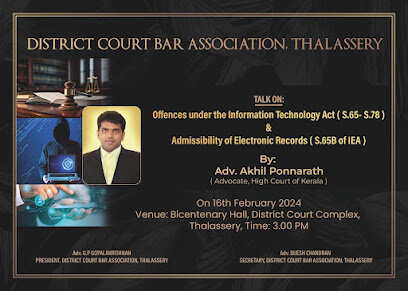Best Child Custody Lawyers in Kannur
Share your needs with us, get contacted by law firms.
Free. Takes 2 min.
Free Guide to Hiring a Family Lawyer
List of the best lawyers in Kannur, India
About Child Custody Law in Kannur, India
Child custody refers to the legal and practical relationship between a parent and their child, including the right to care for, provide for, and make decisions about the child's welfare. In Kannur, India, as in the rest of the country, child custody matters usually arise during divorce, separation, or annulment proceedings. The custody of a child is determined under Indian laws like the Guardians and Wards Act, 1890, Hindu Minority and Guardianship Act, 1956 (for Hindus), and the personal laws applicable to Muslims, Christians, and other communities. The primary focus of the courts is always the welfare and best interests of the child. Custody can be classified as physical custody (with whom the child will reside), legal custody (who will take crucial decisions for the child), or joint custody (shared arrangements between parents).
Why You May Need a Lawyer
Seeking legal advice is highly recommended in child custody matters due to the emotional complexity and significance of these cases. Here are some common situations where you may need a lawyer:
- Divorce or Legal Separation: When parents separate, disputes over who will care for their child are common.
- Child Welfare Concerns: If you are worried about your child's safety or well-being when in the other parent's custody.
- Modification of Existing Custody Orders: Changes in circumstances may necessitate altering custody arrangements.
- Enforcement of Custody Orders: If a parent is violating the court-ordered custody arrangements.
- Relocation: If the custodial parent wishes to move to a different city or abroad with the child, legal permissions may be required.
- Domestic Violence or Abuse: Where concerns about abuse or unfit parenting exist.
Local Laws Overview
Child custody laws in Kannur fall under the jurisdiction of both national and state frameworks. The key points include:
- Best Interests of the Child: Courts prioritize the child's welfare above parental preferences, considering factors like age, health, emotional bonds, the financial situation of parents, and the child's own wishes if they are old enough (generally over 9 years).
- Types of Custody:
- Physical Custody: The child resides with one parent, while the other may have visitation rights.
- Joint Custody: Both parents share responsibilities according to a decided schedule.
- Legal Custody: The right to make decisions about the child's upbringing, schooling, healthcare, etc.
- Applicable Statutes:
- Hindu Minority and Guardianship Act (for Hindus)
- Guardians and Wards Act (secular and applies to all)
- Personal laws for Muslims, Christians, and others
- Mediation: Courts often encourage parents to reach amicable settlements through mediation before proceeding to litigation.
- Visitation Rights: Non-custodial parents generally have visitation rights unless this is deemed harmful to the child.
Frequently Asked Questions
What factors do courts in Kannur consider when deciding child custody?
Courts consider the child's age, emotional attachment and well-being, each parent's ability to provide, the child's wishes (if of sufficient age), stability of the home environment, and sometimes even cultural or religious factors.
At what age can a child decide which parent to live with?
Indian courts may consider the wishes of a child, typically if the child is above 9 years old, but the final decision always rests on what is best for the child.
Can a mother automatically get custody of young children?
There is a general presumption in favor of the mother for children below 5 years, but this is not absolute. The ultimate consideration is always the child's welfare.
What is joint custody?
Joint custody refers to an arrangement where both parents share the responsibilities and rights of child-rearing, either by alternating physical custody or jointly making decisions for the child's upbringing.
What are the rights of the non-custodial parent?
Non-custodial parents are usually granted visitation rights, enabling them to spend time with their child as determined by the court, unless it is against the child's interests.
Can a custody order be changed later?
Yes. If there is a change in circumstances affecting the child’s welfare, either parent can approach the court to modify the custody order.
Is mediation mandatory before filing a custody case in Kannur?
While not mandatory in all cases, courts in Kannur often encourage mediation to help parents reach an amicable solution for the child’s benefit before resorting to litigation.
What happens if one parent takes the child without the other's consent?
If this happens without a valid court order, the aggrieved parent can approach the family court for relief and restoration of custody or for enforcement of visitation rights.
Do grandparents have any visitation or custody rights?
Although not automatic, grandparents can approach the court for visitation or even custody if it’s in the child’s best interests, especially if neither parent is deemed fit.
How long does the child custody process take in Kannur?
Timelines can vary depending on case complexity, court workload, and whether the parents reach an agreement quickly. Cases can range from a few months (if settled) to over a year or more if contested.
Additional Resources
If you need more information or help regarding child custody in Kannur, these resources can be helpful:
- Kannur District Family Court: The primary court handling child custody matters in Kannur.
- District Legal Services Authority (DLSA), Kannur: Provides free or subsidized legal services for eligible individuals.
- National Commission for Protection of Child Rights (NCPCR): Offers information on child rights and can direct you to appropriate resources.
- Kerala State Legal Services Authority (KELSA): Promotes legal awareness, free legal aid, and alternative dispute resolution (ADR) services.
- Local Bar Associations: Can refer you to experienced family law advocates in Kannur.
Next Steps
If you are facing a child custody issue in Kannur and need legal advice, here’s how you can proceed:
- Document all relevant details about your case, including your child's needs and your relationship with them.
- Contact a qualified family lawyer or approach the local bar association for referrals.
- If you require free or affordable legal aid, reach out to the Kannur District Legal Services Authority.
- Prepare any necessary documents such as marriage certificate, child's birth certificate, proof of income, and any relevant evidence.
- Participate positively in mediation or counseling sessions if offered by the court.
- Always prioritize the best interests of your child in any legal proceedings.
- If you feel your or your child’s safety is at risk, inform the police and seek immediate protection orders alongside your custody applications.
Lawzana helps you find the best lawyers and law firms in Kannur through a curated and pre-screened list of qualified legal professionals. Our platform offers rankings and detailed profiles of attorneys and law firms, allowing you to compare based on practice areas, including Child Custody, experience, and client feedback.
Each profile includes a description of the firm's areas of practice, client reviews, team members and partners, year of establishment, spoken languages, office locations, contact information, social media presence, and any published articles or resources. Most firms on our platform speak English and are experienced in both local and international legal matters.
Get a quote from top-rated law firms in Kannur, India — quickly, securely, and without unnecessary hassle.
Disclaimer:
The information provided on this page is for general informational purposes only and does not constitute legal advice. While we strive to ensure the accuracy and relevance of the content, legal information may change over time, and interpretations of the law can vary. You should always consult with a qualified legal professional for advice specific to your situation.
We disclaim all liability for actions taken or not taken based on the content of this page. If you believe any information is incorrect or outdated, please contact us, and we will review and update it where appropriate.













